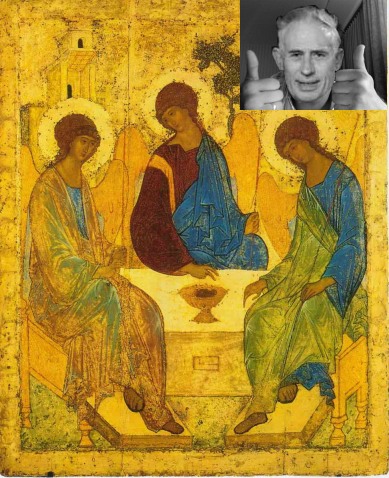The Orthodox Formulas 2: The Council of Constantinople (381)
What is sometimes called the “Nicene Creed” and recited in churches is actually from this later council.
What is sometimes called the “Nicene Creed” and recited in churches is actually from this later council.
Now, on to the Fourth Lateran Council, convened by Pope Innocent III in 1215. This council, considered the 12th “ecumenical” council, was one of the all-time most important councils, which strongly shaped catholicism in the “high†middle ages. It was called, in part, to get another crusade going, after some crusading failures and set-backs. The resulting “constitutions†were proposed (and to some extent written by?)… Read More »The Orthodox Formulas 5: The 4th Lateran Council (1215)
Dr. Michael Bird argues that in Mark, Jesus is “included in the identity” of God.
Does the Gospel According to Mark contain as hidden messages the deity of Christ and the Trinity?
What sort of book is the gospel according to Mark, and what does it really claim about Jesus?
An interesting little exchange between Origen and the pagan critic Celsus about the god of Christians.
I was reading Murray’s and Rea’s new An Introduction to Philosophy of Religion – the Trinity section, of course – and I was struck by this sentence: “… we cannot say that Jesus is the Father, nor can we say that they are two Gods (Deuteronomy 6:4).” (p. 74) I realized some time ago that there are problems in using that famous text as a… Read More »Jesus and “God” – Part 7 – What did the Shema originally mean?
An interesting quote from Fred Sanders‘ “Trinity Talk, Again”, Dialog: A Journal of Theology, 44:3, Fall 2005, 264-72. …the words ‘‘Trinity’’ and ‘‘trinitarian’’ are being employed in unusual new ways in contemporary theological discourse. They sound in a different register than they once did. Your expectations are bound to be frustrated if the occurrence of the word ‘‘Trinity’’ suggests to you that the author intends… Read More »“trinitarian” projects in current theology
Which does the Bible teach, that the one God just is the Father, or that the one God is Father, Son, and Spirit?
In this follow-up post, three factors that make Rufinus’ corruption of Origen’s On First Principles all the more egregious. First, after recklessly changing anything he doesn’t like in translating Origen’s book, absurdly claiming that anything Origen says that doesn’t comport with the (then) new Nicene orthodoxy must have been changed by heretics, and lyingly (or idiotically) claiming to have filled things in only with Origen’s other words or ideas… Read More »Rufinus’s corruption of Origen’s On First Principles – Part 2

Swinburne sez: Two thumbs up for the social analogy!
Richard Swinburne is an Emeritus professor at Oriel College, Oxford University, and is widely considered one of the greatest living Christian philosophers. He’s done original work in philosophy of science, epistemology, philosophy of mind, and general metaphysics, but is perhaps best known for his work in philosophy of religion and philosophical theology. He has a way of squarely facing tough issues, and treating them in original and principled ways. He’s particularly well known by philosophers for his arguments for mind-body dualism, for his cumulative case for the existence of God, and for his bold social trinitarian theory, which I’ll cover in this series. Read More »Swinburne’s Social Trinitarian Theory, Part 1
Is Ned in trouble? Here’s a quick post to wrap up the series on Brower’s and Rea’s constitution theory of the Trinity. First, it’s striking how original and self-consistent their approach is. It is rare to find something this new, and this well thought through on such an old topic. They’ve carefully carved out a unique position, one which has a motivation outside of theology… Read More »Constitution Trinitarianism Part 6: summing up
Earlier catholic theologians like Tertullian and Origen show us how.
Can it be easily shown that the Bible implies that God is tripersonal?
This is one for the history buffs. Check out this piece from my favorite magazine: Hitler’s Forgotten Library. Skip to the end (last 9-10 paragraphs) for the Trinity stuff – which is (I think, ultimately Hegel-inspired) absolute idealist / monist riffing on the Trinity. Can’t muster much interest in that genre myself, since I think monism is obviously false. But I note that some theologians… Read More »Hitler a consumer of trinitarian speculations
Alex @ Alexander Pruss’s Blog urges that even non-social trinitarians can make a priori arguments for their trinitarian theology based on the concept of perfection. I don’t think these sorts of arguments work, as I explain in a comment there, but check it out – Alex is always worth a read, and maybe I’m all wet.
The next theory up to bat is by philosophers Mike Rea of Notre Dame and Jeff Brower of Purdue University. In some ways Mike reminds me of his mentor Al Plantinga – a tall guy you don’t want to argue against unless you absolutely have to. He’s published many articles in metaphysics and philosophy of religion, and is perhaps best known for this book. He’s presently editing several books, including one of recent essays on the Trinity, which I’m really looking forward to seeing. Jeff is one of the best medieval philosophy specialists around, focusing on metaphysics, philosophy of religion, and ethics. I think he has excellent tastes in medieval philosophers. Both of these guys are top-notch, and you’ll always learn a lot from anything they publish. Both of them, by the way, have many papers available to download from their websites, and their other Trinity work will surely be discussed here at some future date. The one I’ll be discussing in this series is here. Theirs is a bold and controversial theory, and one which is quite out of step with the Social Trinitarian views that have been so popular of late.
“Material Constitution and the Trinity” (Faith and Philosophy 22:1, Jan 2005, 57-76) is a difficult and technical article, dense with argument. Philosophers will appreciate how well it’s crafted; I not sure many others can get through it! Here I’ll just lay out the broad lines of it, getting slightly more precise in future installments. Consider Ned the gnome:

How many things are pictured here? Read More »Constitution Trinitarianism Part 1: Ned and Lumpy
In this recent book, Dr. Winfried Corduan re-opens the case for “original monotheism,” the view that the forms of human religion which are probably the oldest, are mostly monotheistic, which is what one would expect if the earliest human religions were all or mostly monotheistic.
JT Paasch is a graduate student at Oxford, he’s originally from Utah. He earned a M.Div at Trinity Evangelical Divinity School (under Kevin Vanhoozer), then went to Oxford to work with Richard Cross on medieval trinitarian theology. His doctoral thesis is titled ‘The Logic and Metaphysics of the Trinity according to William of Ockham’. I’ve appreciated his thoughtful comments on some of my posts here. I thought the following one was post-worthy.
Be sure to check out his blog, the title of which is either (1) contradictory, or (2) an example of English (or Utahn?) dry humor. I say the charitable interpretation is (2). 🙂 – Dale
In the traditional western view of the trinity, e.g., as the likes of Augustine and Aquinas think, the divine essence basically functions as a nature. Read More »Guest post: JT Paasch on constitution trinitarianism